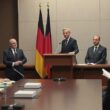The German Environmental Aid (DUH) has called for a faster tightening of air pollution limits. The new limits should be implemented in Germany two years ahead of schedule and become mandatory by 2028, according to the organization’s federal managing director, Jürgen Resch, on Thursday. “By at the latest 2035, the stricter limit proposals of the World Health Organization should be binding and enforced everywhere in Germany” Resch said.
The German Environmental Aid had published figures from the European Environment Agency (EEA) last week, showing the consequences of air pollution for all German districts and independent cities. According to the data, a total of 3,527 people die in Berlin every year due to high particulate matter pollution and 1,414 due to nitrogen dioxide. In the Ruhr region, up to 150 deaths per 100,000 inhabitants are attributed to particulate matter and 80 to nitrogen dioxide, annually.
“The numbers from the European Environment Agency clearly show: every further delay in effective measures costs human lives” Resch said. “To avoid the more than 70,000 annual deaths due to poor air quality, swift action is necessary. The new EU limits for diesel exhaust nitrogen dioxide are exceeded at 43 percent of the monitoring stations and the World Health Organization’s recommendations at 78 percent” the managing director added. “As for the fine particle pollution, the situation is not better: the World Health Organization’s recommendation is not met at almost none of the monitoring stations in Germany.”
The World Health Organization had adjusted its limit recommendations in September 2021, based on the current state of the science and significantly reduced the recommended limits for nitrogen dioxide to 10 micrograms per cubic meter and for fine particles to 5 micrograms per cubic meter. Adherence to these limits could, according to the European Environment Agency, prevent 32,628 premature deaths due to fine particle pollution and 9,442 due to nitrogen dioxide pollution in Germany each year.
Currently, the 2008-adopted limits of 40 micrograms per cubic meter in the annual average for nitrogen dioxide and 25 micrograms per cubic meter for fine particles (PM2.5) are in effect. The European Union has set new limits of 20 micrograms per cubic meter in the annual average for nitrogen dioxide and 10 micrograms per cubic meter for fine particles, effective from 2030.





